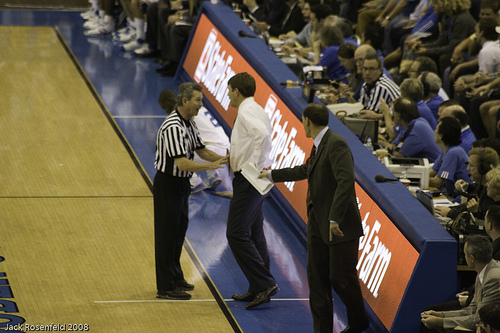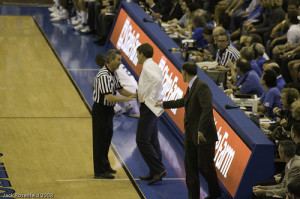Talking with Officials

A common subject we often hear around basketball courts is the trouble many coaches have in developing a working relationship when talking with officials. This can be for a variety of different reasons. Most of which are the result of emotional judgements and highly stressful situations.
The sport of basketball cannot be played without players, coaches and officials. In addition there are many other roles which are pivotal to the success of any game performed by any number of volunteers and administrators. But few have as much potential for conflict as the relationship between coaches and officials.
Most coaches understand what behaviours are acceptable and those that should be not demonstrated on the sideline of your local High School basketball or other junior events. However something which is not discussed is when it is appropriate to engage in talking with officials. There are a number of times within any basketball game that you can within the rules of the game try to start a discussion or pass comments onto officials.

Before the Game: Probably one of the key times for you to start to set your expectations outline your concerns and raise questions when talking with officials. Your Pre Game discussion is an invaluable time for any coach to try and discuss any likely issues. For coaches engaged in tournament play that might mean the way in which a foul in certain situations is being called. For coaches in weekly fixtures the content of the discussion might focus on a particular issue from the previous week which became a focus for the game. For the astute coach if you have scouted your opponents, this conversation may focus on your opponents style of play such as when they ‘bump’ a cutter they also grab the opposing players singlet.
Quarter and Halftime Breaks: during the game these times are the best for moderate discussions. If you want to speak with the referee or umpires give the officials some time to move towards the score bench. Most on court officials will usually have a drink. Following this it is then time to move towards them for a conversation. You are best to highlight something for the start of the next period then offering criticism. By doing this you will hopefully draw to the attention of the officials an issue you (and possibly your team) are seeing. Always make sure your team is catered for first and foremost before starting a discussion with the games officials.
Timeouts: Remember time-outs are only for one minute so talking with officials during these periods of time must be brief and to the point. Just because time is short however it does not mean you can be aggressive, confronting or threatening. Maintain your composure and look for the specific things you would like to say and be succinct about it. When you talk to your players during time-outs a rule of thumb is to only speak about three things, the same applies to speaking with officials during this period.
Foul shots: Depending on what bench your team is sitting at. The referees must take up set positions on foul shots. One near the edge of the backboard and the other foul line extended. It is this official you can sometimes talk to. You might only have a matter of seconds but it may be enough for you to highlight a potential issue.
Post-Game: Talking with officials after a game is an invaluable opportunity to gain insight as to why certain aspects of the game unfolded the way they did. As a coach if you feel a certain aspect of the game was called in a different than the expected standard, then this is the opportunity to clarify the discrepancy in perspectives. You can take your time and work through the opinion of the officials. You might even learn something about the calling of the game.
An interesting point to close on, talking with officials is usually done when an issue or problem arises from the perspective of the coach or players. In this scenario the coach only chooses to engage and start talking with officials in negative situations only. Not really the best way to start and maintain a positive and cooperative working relationship. Try to build a positive repour with your games officials from the moment you meet them and build a positive and open atmosphere for later possible avenues of dialogue.


